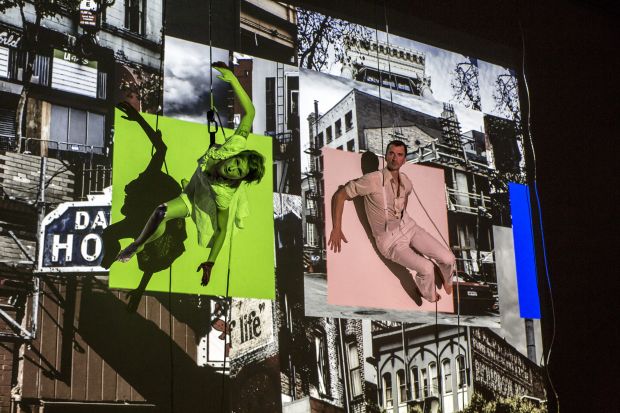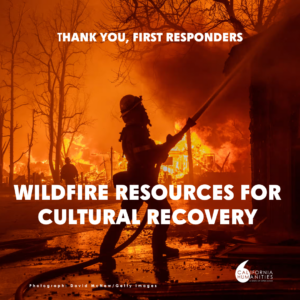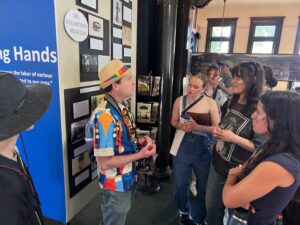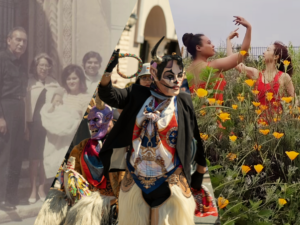Seventeen new public humanities grantees will receive funding through the latest round of Humanities for All Project Grant program, at a total of $299,257. They include a series of story-sharing events contributing to the development of a new play that reimagines the classic A Thousand and One Nights to disrupt stereotypes about Middle Eastern and Islamic cultures in Oakland, to a monthly summer program in Boyle Heights highlighting the local mariachi community and focused on preserving this valuable cultural form in the face of rapid urban development and generational change. Every project in this round of grants contributes to a rich portrayal of California’s culture, people, and history.
Check out our calendar here and subscribe to our eNews to stay tuned for updates about events in your region.
Our Project Grant program, a branch of our Humanities for All grants, offers funding (from $10,000 to $20,000) awarded twice a year for larger public humanities projects of up to two-years duration from the award date. Programming formats include but are not limited to interpretive exhibits, community dialogue and discussion series, workshops and participatory activities, presentations and lectures, conversations and forums, and interactive and experiential activities.
In the December 2019 round of Humanities for All Quick Grant awards, California Humanities designated two specific funding focus areas: Youth Voices, and, for the first time this grant round, Second Responders: The Humanities in the Aftermath of Natural Disasters.
YOUTH VOICES
California Humanities has a strong interest in humanities programming that will reach and engage the next generation. These projects involve teens as primary program participants or audiences, and address topics or subjects of interest to them (denoted by “*”).
SECOND RESPONDERS: THE HUMANITIES IN THE AFTERMATH OF NATURAL DISASTERS
The special designation Second Responders: The Humanities in the Aftermath of Natural Disasters, supported by an NEH Chairman’s Award, is intended to assist California communities in recovering and healing as well as to raise awareness about natural disasters such as wildfires, floods, and mudslides (denoted by “‡”).
Grants Awarded in December 2019
California Humanities designated two specific funding focus areas for Humanities for All Project Grants: Youth Voices (denoted by “*”) and Second Responders (denoted by “‡”).
The 1000 Ships Project*
RYSE, Inc., Richmond
Project Director: Tara Malik
The 1000 Ships Project will recover, preserve and share stories about the role the Richmond shipyards played in shaping families and community in this East Bay city. In collaboration with California Shakespeare Theater and Allen Temple Arms retirement home, a cohort of youth interns will help develop, facilitate, document, and participate in story circles with community elders. These stories will provide inspiration for interns’ individual artistic projects and showcases, as well as the development of a new play, A Thousand Ships, premiering Summer 2021. Stories will be shared through multiple media, including spoken word and poetry events, a visual art exhibition, audio slide shows, podcasts, dance and video, and a community night celebration prior to the play production. By creating loving spaces for young people’s family and community history stories to be preserved, shared and valued, the project will ensure that individual narratives are carried forward and connected to broader community stories, building social consciousness about the relevance of these stories today to the people of Richmond. $20,000
1,001 Stories Project
California Shakespeare Theater, Berkeley
Project Director: Raeshma Razvi
A collaborative endeavor involving the Islamic Cultural Center of Northern California along with independent artists, scholars and community members, the 1,001 Stories Project aims to disrupt conventional stereotypes about Middle Eastern and Islamic cultures, and promote conversation and communication within Bay Area Middle Eastern, North African, and South Asian (MENASA) communities as well as the broader public about the themes of feminism, plurality, and democracy. Project activities, including a series of story-sharing events involving the Shahrazad Squad, a group of Bay Area women of MENASA backgrounds, will contribute to the development of a new play, 1,0001 Nights—A Retelling, a contemporary reimagining of the classic A Thousand and One Nights, that will be mounted as a full-scale theatrical production in August 2020, accompanied by a variety of community engagement events including panel discussions, talk-backs, and community dialogues. Drawing on insights provided by contemporary scholarship and community members, the entire project will empower individuals and communities throughout the region by providing spaces for reflection, discussion and dialogue that will promote greater understanding of the richness and complexities of MENASA culture. $18,000
Ashes from Ashes: Recovering Cremains from the Wreckage of California Wildfires‡
Sonoma State University, Rohnert Park
Project Director: Dana Shew
As people flee from threatening wildfires, frantically waking family members and collecting pets and belongings from their homes, the ashes of cremated loved ones (cremains), are more often than not left behind. In the tragic event that homes are lost to these increasingly destructive and frequent fires, the inadvertently overlooked cremated remains become part of the charred remnants of people’s homes, almost indistinguishable from the burnt debris. Anything that is not salvaged afterward from the wreckage is considered toxic waste and disposed of as such, including the lost ashes of loved ones. This project aims to capture the stories and reflections of the archaeologists, dog handlers, and affected families through creation of a short video that will feature interviews and footage from cremains recoveries. The video will provide a focus for screenings, panel discussions, and other public events in communities around the state beginning in fall 2020. A project website will house clips of the oral history interviews and provide information about cremains recovery including the methods, process, volunteer opportunities, and ways to receive services. $20,000
BANDALOOP’s #OaklandPublicCanvas
Project BANDALOOP, Oakland
Project Director: Amelia Rudolph
#OaklandPublicCanvas is a new large-scale free outdoor performance work by BANDALOOP that will integrate vertical dance, spoken word, music, and video and informed by residents’ stories, songs, and poems about their home, Oakland. The project will engage small groups of community members through workshops in Bandaloop’s studio in developing the piece, while a larger cohort of residents of all ages, races and backgrounds will provide the audience for the open rehearsals and performances. #OaklandPublicCanvas will be a new iteration of #PublicCanvas, which premiered in 2016 as #SFPublicCanvas in San Francisco’s Tenderloin District with video, spoken word, and visuals by community members. Subsequent touring productions have been mounted in Atlanta, Georgia and Providence, Rhode Island, and a production in Los Angeles is in process. In Oakland, Bandaloop will make the new piece beginning with artist gatherings, town halls, and open rehearsals in early 2020, and premiere it in fall 2020. Amplifying underrepresented voices, #OaklandPublicCanvas will be a platform for residents to share their stories and offer their views on the health of their city including what might need to change. $13,000
Carr and Camp Fires Oral History Project‡
CSU, Chico Research Foundation, Chico
Project Director: Marianne Paiva
The Carr and Camp Fires Oral History Project is a storytelling project that will gather, preserve, and archive the voices of survivors and first responders affected by the 2018 wildfire disasters in Northern California. A collaboration between the CSU Chico Sociology Department, North State Public Radio (NSPR), and Meriam Library’s Special Collections and University Archives, the project will consist of three phases: storytelling, listening, and reflection. Drawing from both new and already-conducted oral histories and interviews with community members, audio recordings will be edited for a radio show to be aired on NSPR during the anniversaries of the Carr and Camp Fires in fall 2020. The interviews will be summarized and cataloged along with photographs, art, and archival materials donated by the storytellers. These materials, along with photographs of participants, will provide content for exhibits at public libraries within the service region during 2020 and 2021. The oral history interviews will remain publicly accessible and preserved for posterity at the CSU Chico Meriam Library in the Special Collections and University Archives Department. $19,959
Cross-Cultural Voices & Explorations to Empower Change [working title]
Oakland Asian Cultural Center, Oakland
Project Director: Akemi Imai
Beginning January 2020, Oakland Asian Cultural Center (OACC) will offer Cross-Cultural Voices & Explorations to Empower Change, a two-year programming series encompassing film screenings, workshops, performances, book talks, readings, and oral histories that will give voice to Asian/Pacific Islander (API) communities underrepresented in the humanities while exploring pressing issues ranging from immigration and refugee crises to climate change to aging & senior care. Seven programs will be offered in close partnership with community partners, humanities experts, and presenters representing many disciplines (performing, visual, literary, theatrical, etc.), each exploring a topic that reflects current concerns within the API community). In addition to reaching Bay Area API communities, the project will also aim to reach a broad, general audience, and foster understanding, empathy and solidarity among participants and empower their civic engagement through highly participatory learning and shared experiences. $13,000
Deep Humanities and Arts for Socially Responsible Technology
San Jose State University Research Foundation, San Jose
Project Director: Revathi Krishnaswamy
Digital technologies, including the internet and social media, have become not only ubiquitous but also virtual extensions of our inner selves. While they offer opportunity for free, unconstrained, anonymous expression, their power to reproduce or amplify inequities and injustices has also thrown up new challenges and responsibilities. The need to identify fake news and counter disinformation, harassment, discrimination, and disparity is becoming not only a pressing technological challenge but also an urgent civic responsibility. Deep Humanities for Socially Responsible Technology is a multifaceted project aimed at engaging the local community in exploring these topics. Funding will support a series of activities including an online story contest, a map building hackathon, and a story slam, leading to the creation of an interactive, multimedia, digital San Jose Story Map composed of people’s ideas, memories, experiences, thoughts, and feelings about the place they call home or workplace in the high-tech hub’s various neighborhoods/locations. A team of faculty and students from San Jose State University will lead the project, which will be conducted in collaboration with Dr. Martin Luther King Jr. Library, the major public library network serving the San Jose area, connecting the academic community with the public at large in order to advance a more inclusive, culturally sensitive, civic minded, and socially responsible approach to digital technology. $20,000
Miercoles de Mariachi
East Los Angeles Community Corporation, Los Angeles
Project Director: Cesar Castro
Miércoles de Mariachi will be a series of summer events in 2020 produced by East LA Community Corporation and the Mariachi Coalition in the Boyle Heights neighborhood of Los Angeles that will uplift the local mariachi community and bring recognition to their cultural contributions. Monthly programs at Mariachi Plaza and adjacent First Street will feature live participatory performances, storytelling, educational workshops, and a changing pop-up gallery exhibition of archival objects and media. Connecting low-income Latino residents on the Eastside of Los Angeles with culture bearers, musicians, oral historians, curators, organizers, and other community members who are stakeholders in the future of Mariachi Plaza and its performers, the project will create a participatory space where residents come together to learn about and reflect on their shared history and the contemporary conditions that have contributed to the disappearance of essential cultural practices and encourage awareness of the importance of maintaining and celebrating mariachi culture and its roots. $13,000
One Community, Many Voices*
Inlandia Institute, Riverside
Project Director: Cati Porter and Rachelle Cruz
One Community, Many Voices, harnesses young people’s power to change the future both as leaders and as program participants. Issues of race, culture, gender, sexuality, income inequality, and ethnicity will be explored through a two-tiered humanities program that addresses the major socioeconomic factors facing the Inland Empire, home to 4.5 million people, and an historically underserved and disadvantaged region where 2.2 million residents are Latinx and two out of three claim a minority heritage. The project will kick off in summer 2020 with a creative writing summer program for young people in the Inland Empire, which will incorporate and highlight the first “Big Read” selection, There Should Be Flowers, a poetry collection. The second selection, Still Water Saints, a novel, will be spotlighted in spring 2021. Both books are by local LGBTQ authors. Discussion groups led by activists and educators in LGBTQ issues and a series of public programs featuring author readings and conversations will provide opportunities for community engagement. These activities will segue into a series of writing workshops led by the Inlandia Literary Laureate and trained student interns from local colleges and universities. These programs will encourage participation from LBGTQ youth and young adults, using themes and prompts generated from earlier community discourse in order to explore the potential of creative expression, to promote personal growth, and to foster inclusion and radical acceptance in the wider community. $11,000
Preserving the History of South Los Angeles: A Community Digitization Initiative
Pepperdine University, Malibu
Project Director: Mark Roosa
This project seeks to document, preserve, and share the often-neglected history of one of America’s most vibrant African American communities. Pepperdine University Libraries and its partners will organize a series of community digitization events to catalogue and preserve artifacts, documents, and memories of the African American experience in South Los Angeles between the 1930s and 1970s. Beginning in fall 2020, digitization events will be held in community spaces provided by program partners led by the project team, who will scan artifacts and documents and record associated oral histories of the South LA community members, many of whom are of advanced age. A culminating event at the California African American Museum in December 2021 will provide the means to present key findings and explore next steps with community members and other stakeholders. A curated selection of digitized materials will be added to an open access, online portal accessible to students, scholars, and others interested in history, critical race students, and social anthropology. $19,815
Revealing Women in the Archives
Autry Museum of the American West, Los Angeles
Project Director: Carolyn Brucken
As the 2020 centennial of women winning the vote approaches, the Autry Museum of the American West seeks to celebrate and facilitate discovery of women’s historical contributions. Launching in January 2020, the Revealing Women in the Archives project will encompass an exhibition drawing on the museum’s own archival collections, archiving workshops for college-age women, a public talk, collaborative partnerships with local archives and organizations, and social media content that will empower a shared discovery of women’s voices and explore how the recovery of women’s archives changes how we view history and ourselves. It asks a broad public to join a conversation around fundamental questions: what do we (personally and collectively) save? What do people value enough to collect? What do we discard? Who are—or could be—the users and creators of women’s archives today? Archives are an ideal vehicle to provide a variety of learning experiences, including collaborative learning, facilitated discussion, creative storytelling and empathy. Through fostering “Discovery” of the archive by others—of the intellectual content and the physical materials—and raising awareness of the importance of archiving, the project will explore the idea that the first step in representing the accomplishments of women in history is often to take care of the materials that tell women’s stories, so they can be discovered and revealed. $20,000
Rumbo A California—An Exhibition of the Strachwitz Frontera Collection Celebrating California’s Mexican American Musical Legacy
Arhoolie Foundation, El Cerrito
Project Director: Adam Machado
Rumbo a California will be a traveling multi-media exhibit, featuring 78 and 45 rpm discs with playlists available digitally and ambiently, LP covers, photographs, posters, cinema lobby cards, self-guided audio, thematic podcasts, bilingual label copy, and bilingual transcriptions of topical corridos addressing the themes of immigration, California as symbol and destination/the Dream of California, pachuco culture, the United Farm Workers Movement, the Chicano Civil Rights Movement, natural disasters, important historical figures, crime, politics, cultural identity, love, and death. The exhibit will draw from materials in the Strachwitz Frontera Collection housed at UCLA, the nation’s premiere audio collection documenting the Mexican American experience. As it travels to venues around the state beginning in January 2021, the exhibit will be enhanced with live music performances and panel discussions that will enable attendees to appreciate the rich interplay between historical forces affecting the lives of California’s Mexican Americans and their music, which both responds to and informs these historical forces. Arhoolie Foundation will also provide outreach to, and resource materials for, local and regional middle schools, high schools, and colleges. $20,000
Sharing Comfort and Care: Intergenerational Story-Mapping in the Cambodian, Native Hawaiian, and Pacific Islander Communities of Orange County
The Regents of the University of California, Irvine
Project Director: Judy Wu
Asian American and Pacific Islanders (AAPI) are the two fastest growing populations in the US and in Orange County, which ranks third nationally for its populations of AAPIs. Sharing Comfort and Care seeks to promote intergenerational and intercultural sharing of stories related to migration, health care, and food for two of the most underrepresented groups within this census category, namely Cambodians and Native Hawaiian Pacific Islanders (NHPI). California is home to the largest Cambodian American community and second largest NHPI community in the United States. The project team, based at UC Irvine, will partner with two local community colleges and two community-based organizations (Empowering Pacific Islander Communities and The Cambodian Family) to train underrepresented college students to conduct oral histories with community elders, create digital story-maps and exhibits, and publish cookbooks. The results will be featured in a series of public events beginning in January 2021 that will illustrate migration routes, explain health challenges, and demonstrate cultural foodways as practices of resilience within the Cambodian, Native Hawaiian, and Pacific Islander communities. $20,000
Tanforan Assembly Center Exhibit
San Francisco Bay Area Rapid Transit District, Oakland
Project Director: Jennifer Easton
The Tanforan Assembly Center Exhibit project will include the design and installation of a long-term exhibit inside the San Bruno BART station that will support a deeper understanding of the impact of Executive Order 9066 issued by President Roosevelt authorizing the internment of tens of thousands of American citizens of Japanese ancestry and resident aliens from Japan, particularly on Japanese Americans from the Bay Area. The station is located at the site of the former Tanforan Racetrack, one of the “assembly areas” where Japanese Americans were forced to gather for transport to the detention camps. With its placement in a public transit facility now adjacent to a shopping center, the exhibit will make this history available to an audience who may not otherwise access exhibits in more traditional facilities and retain the history in situ. The project will involve an intergenerational team of humanities experts, exhibit professionals, people who personally experienced the detainment facilities, children of detainees, and young curators who can see the past through the eyes of the future. An opening event in spring 2021 will provide an opportunity for members of the public to engage with the humanities experts, while online materials, brochures, tours and other interpretive activities will provide long-term information and learning opportunities. $20,000
Wakaji Matsumoto: An Artist in Two Worlds, Los Angeles and Hiroshima, 1917-1944
Japanese American National Museum, Los Angeles
Project Director: Clement Hanami
Wakaji Matsumoto: An Artist in Two Worlds, Los Angeles and Hiroshima, 1917–1944 is a travelling exhibition accompanied by a public programming series, focusing on an artist who represents a generation of talent that was influential at the time in both the US and Japan, whose legacy has been largely forgotten. Wakaji’s art created a documentary record of the lives of Japanese immigrant farmers in rural Los Angeles in the early 1900s. After his return to Japan in 1927 he also created extremely rare images of urban life in Hiroshima. Wakaji was an active member of the Los Angeles Japanese Camera Club and a pioneer in the pictorialist movement, as evidenced in many of his works. Some of the most progressive art photographs made in America were created in the 1920s by Japanese immigrants in the Little Tokyo District of Los Angeles. The exhibit, which will open in October 2020, will showcase a selection of rare photographs never before seen in the US, including rare photographic images of Hiroshima before the atomic bombing in 1945, and provide a rare glimpse into the lives and accomplishments of Japanese immigrants in California, as well as into the unique and tragic history of Hiroshima City. $20,000
We the People: 50 Years of Women’s Studies and Activism Through Art
San Diego State University Research Foundation, San Diego
Project Director: Arzu Ozkal
In Spring 2020, the School of Art + Design at San Diego State University (SDSU) will mount We the People: 50 Years of Women’s Studies and Activism Through Art, an exhibition at the SDSU Downtown Gallery in coordination with and celebration of the 50th anniversary of SDSU’s Department of Women’s Studies, the first department of its kind in the United States. In an era of widespread interest in social justice, We the People will showcase selected artwork of high-profile female artists from the late 1960s to the present who have creatively addressed topics of feminism and gender equality. Accompanying educational programs (including artist lectures, panel discussions, interactive workshops, and live performances) will engage high school and college students, members of community organizations serving underrepresented populations, and the general public in meaningful dialogue about identity, community, and human rights. Through these means, We the People will provide rich arts and humanities experiences, along with a robust forum in which to explore the essential qualities of inclusivity, diversity, and compassion. $11,483
You Are Here: California Stories on the Map
Oakland Museum of California, Oakland
Project Director: Penny Jennings
You Are Here: California Stories on the Map will open on February 14, 2020 and will be on exhibit for approximately two years, along with an array of programs and activities geared for the general public and school visitors. The exhibition will help visitors engage with maps using a critical and inquisitive eye and will inspire visitors to consider that maps are a tool that anyone can use to share ideas, information, or aspirations for a place. Although mapping and cartographic practice were historically used by governments and those in power, in recent years mapmaking has been democratized and repurposed by communities and artists as storytelling and community organizing tools. This exhibition will leverage OMCA’s interdisciplinary strengths, using maps from the arts, history, and sciences to explore ideas about maps as a tool for communication. By comparing and contrasting different types of maps, visitors will develop a richer understanding of mapping as a cultural practice and form of storytelling, and cultivate their own abilities to better read and understand the stories in the maps that they encounter, and to tell their own story through the maps that they make. $20,000
Click here to see the list of Humanities for All Project Grant projects funded to date. Visit the Humanities for All Funding webpage for more information.






